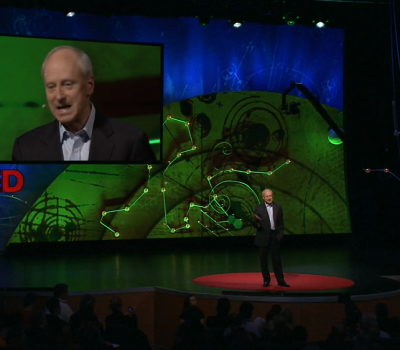ハーバード大学教授で企業倫理の第一人者のマイケル・サンデル(Michael Sandel)のTEDスピーチの英語を徹底解説する。日本語訳なしでも理解できるよう、単語と文法をわかりやすくご説明する。日本語訳ではわからない、マイケル・サンデルの本当のメッセージを感じて欲しい。
スピーチの題名は「Why we shouldn’t trust markets with our civic life」(なぜ市場に市民生活を託すべきではないのか)(2013年6月収録)だ。マイケルは、子どもの教育などを例に、市場経済が現代社会に及ぼしている影響について語っています。お子様をお持ちのビジネスパーソンの方におすすめだ。
なお、TED Talk でのオリジナルスピーチの画像は「Why we shouldn’t trust markets with our civic life」で楽しんでほしい。
Here’s a question we need to rethink together: What should be the role of money and markets in our societies? Today, there are very few things that money can’t buy. If you’re sentenced to a jail term in Santa Barbara, California, you should know that if you don’t like the standard accommodations, you can buy a prison cell upgrade. It’s true. For how much, do you think? What would you guess? Five hundred dollars? It’s not the Ritz-Carlton. It’s a jail! Eighty-two dollars a night. Eighty-two dollars a night. If you go to an amusement park and don’t want to stand in the long lines for the popular rides, there is now a solution. In many theme parks, you can pay extra to jump to the head of the line. They call them Fast Track or VIP tickets.
Here’s: “Here is 〜”「~は以下の通りです」
a question we need to 〜: “question” の後に関係代名詞 “that” もしくは “which” が省略されている。「我々が〜する必要がある “question”」の意。
rethink /riθíŋk/ (動) 考え直す ⇨ “re” は “again” の意味で「再び考える」の意。
there are very few things that money can’t buy: “few” は “a” がつくと「少しの〜」、 “a” がつかないと「ほとんどない」の意。 “that” は関係代名詞で “things” 以下は「お金が買えないもの」の意。全体では「お金が買えないものはほとんどない」の意。
If you’re (you are) 〜: “if” は接続詞で条件節を導く「もし〜ならば」の意。仮定ではない。
sentence /séntəns/ (動) (人に) 判決を下す ⇨ be sentenced to 〜: 〜の判決を下される。
jail /dʒéil/ (名) 拘置
term /tə́ːrm/ (名) 期間 ⇨ jail term 刑期
Santa Barbara: 米カリフォルニア州サンタ・バーバラ市
accommodation /əkɑ̀mədéiʃən/ (名) 収容設備
prison /prízn/ (名) 拘置所
cell /sél/ (名) 独房
upgrade /ʌ́pgrèid/ (名) (宿泊施設の部屋の) アップグレード
for /fər/ (前) ここでは「〜の金額で」の意。
guess /gés/ (動) 推測する
What would you guess?: “would” は婉曲表現で「〜だろう」の意。ここでは「あなたは何だろうと推量する?」の意。
amusement park /əmjúːzmənt/ /pɑ́ːrk/ (名) 遊園地 ≒ “theme park”「テーマパーク」
ride /ráid/ (名) 〔遊園地などの〕乗り物
stand in the long lines for the popular rides: 「人気の乗り物のための行列の中に立つ」から「人気の乗り物の列に並ぶ」の意。
extra /ékstrə/ (名) 追加料金
jump to the head of the line:「列の頭へとジャンプする」から「列の先頭に入る」の意。
fast track /fǽst/ /trǽk/ (名) 追加料金急行列車用線路(“track” (名) 線路) ⇨ ここでは「優先通路」。
And this isn’t only happening in amusement parks. In Washington, D.C., long lines, queues sometimes form for important Congressional hearings. Now some people don’t like to wait in long queues, maybe overnight, even in the rain. So now, for lobbyists and others who are very keen to attend these hearings but don’t like to wait, there are companies, line-standing companies, and you can go to them. You can pay them a certain amount of money, they hire homeless people and others who need a job to stand waiting in the line for as long as it takes, and the lobbyist, just before the hearing begins, can take his or her place at the head of the line and a seat in the front of the room. Paid line standing.
this isn’t only 〜 : “this” は “Fast Track” や “VIP tickets” のこと。
queue /kjúː/ (名) 待っている列 = line /láin/
form /fɔ́ːrm/ (動) 生じる
congressional /kəngréʃnl/ (形) 議会の
hearing /híəriŋ/ (名) 公聴会 ⇨ “Congressional hearings”「議会の公聴会」
overnight /óuvərnáit/ (副) 夜通し(“wait” を修飾)
lobbyist /lɑ́bist/ (名) ロビイスト
and others: 〜など
be keen to 〜: ~したがっている
for lobbyists and others who are 〜: “who” は関係代名詞で先行詞は “lobbyists and others”。全体では「〜であるロビイストなどの人にとって」の意。
but (who) don’t like to wait,: カッコ内の関係代名詞が省略されている。先行詞は “lobbyists and others” で、“who are very keep to 〜” を並列。
line-standing companies: 前の “companies” を言い換えている。「行列に並ぶ会社」の意。
a certain amount of 〜: ある程度の〜
hire /háiər/ (動) 雇う
homeless /hóumlis/ (形) 家のない
who need a job to stand waiting in the line: “who” は関係代名詞で先行詞は “homeless people and others”。 “waiting 〜” は現在分詞で「〜待ちながら」の意。全体では「行列で待ちながら立つ仕事が必要な〜」。
for as long as it takes: “for” は「〜の間」の意。 “as long as 〜”「~の間」。 “it takes” は「それが必要とする」のニュアンス。全体では「必要とされる間」の意。
the lobbyist, just before the hearing begins, can take 〜: “just 〜 begins” は挿入語。カッコに入れると理解しやすい。
take his or her place: “take one’s place” ここでは「場所を確保する」の意。
the head of the line: 行列の先頭
a seat in the front of the room: “in the front of 〜”「〜の前方の」 ⇨ 全体では「部屋の前方の座席」
Paid line standing: 一つの名詞で要約している。「有料行列待ち係」のニュアンス。
It’s happening, the recourse to market mechanisms and market thinking and market solutions, in bigger arenas. Take the way we fight our wars. Did you know that, in Iraq and Afghanistan, there were more private military contractors on the ground than there were U.S. military troops? Now this isn’t because we had a public debate about whether we wanted to outsource war to private companies, but this is what has happened.
It’s happening: “It” は漠然と状況を表す。「起こっています。」のニュアンス。何が起こっているかは、この後に説明している。
recourse /ríːkɔːrs/ (名) 頼ること
mechanism /mékənìzm/ (名) メカニズム ⇨ “market mechanisms”「市場メカニズム」の意。
market thinking: 市場の考え方
market solution: 市場による解決
arena /əríːnə/ (名) (活動)領域
take the way we fight our wars: ここでの “take” は「〜を取り上げる」の意。 “way” は「方法」。 “way” の後に関係副詞 “that” もしくは “in which” が省略されている。全体では「我々がどのように戦争をしているかを取り上げてみよう。」のニュアンス。
Iraq /irɑ́ːk/ (国名) イラク
Afghanistan /æfgǽnəstæ̀(ː)n/ (国名) アフガニスタン
private /práivət/ (形) 民間の
military /mílətèri/ (形) 兵士の
contractor /kɑ́ntræktər/ (名) 請負業者 ⇨ “private military contractor”「民間請負兵士」
on the ground: 現場で
troop /trúːp/ (名) 《複数形で》軍事部隊
public debate: 国民的論議
Now this isn’t because we had a public debate about whether 〜: 「〜かどうかについての国民的論議があったから(ここで言っているの)ではない」のニュアンス。
outsource /àutsɔ́rs/ (動) 外部委託する
what has happened: “what” は先行詞を含む関係代名詞で “the thing which” に置き換えられる。結果を表す現在完了形なので、全体では「起こったこと。」の意。
Over the past three decades, we have lived through a quiet revolution. We’ve drifted almost without realizing it from having a market economy to becoming market societies. The difference is this: A market economy is a tool, a valuable and effective tool, for organizing productive activity, but a market society is a place where almost everything is up for sale. It‘s a way of life, in which market thinking and market values begin to dominate every aspect of life: personal relations, family life, health, education, politics, law, civic life.
decade /dékeid/ (名) 10年間 ⇨ “three decades”「30年間」
live through 〜: 〜を乗り切る
drift /dríft/ (動) 横滑りする ⇨ ここでは “drifted from 〜 to …”「〜から…へと横滑りした」の意。
almost without realizing it: 挿入語なのでカッコに入れると理解しやすい。 “it” は「“drift” したこと」
market economy: 市場経済
market societies: 市場社会
a valuable and effective tool: 前の “tool” を説明している。カッコに入れると理解しやすい。
organize /ɔ́ːrgənàiz/ (動) 体系化する
a place where almost everything is 〜: “where” は関係副詞で先行詞は “a place” で「ほとんどすべてが〜な “place”」の意。
up for sale: 売りに出されて
It’s a way 〜: “It” は “market society” を指す。
in which market thinking 〜: “which” は非制限用法の関係代名詞で先行詞は “life”。 “in which” で全体で非制限用法の関係副詞(先行詞は “life”)と考えることもできる。「その “life” というのは、“market thinking” が〜なところ。」の意。
dominate /dɑ́mənèit/ (動) 支配する
every aspect of one’s life: 人生のあらゆる側面 ⇨ コロン以下 “aspect” の例をあげている。
Now, why worry? Why worry about our becoming market societies? For two reasons, I think. One of them has to do with inequality. The more things money can buy, the more affluence, or the lack of it, matters. If the only thing that money determined was access to yachts or fancy vacations or BMWs, then inequality wouldn’t matter very much. But when money comes increasingly to govern access to the essentials of the good life — decent health care, access to the best education, political voice and influence in campaigns — when money comes to govern all of those things, inequality matters a great deal. And so the marketization of everything sharpens the sting of inequality and its social and civic consequence. That’s one reason to worry.
Why + 動詞の原形: なぜ〜するの? ⇨ “Why worry (about 〜)?”「(〜について) なぜ心配するの?」
about our becoming market societies: 動名詞の意味上の主語が代名詞の場合は所有格になる。つまり、“becoming 〜”「〜になること」の主語は “our”。全体では「我々が市場社会になることについて」の意。
For two reasons: “for” はここでは理由を示し「〜の理由で」の意。
have to do with 〜: ~と関係がある
inequality /ìnikwɑ́ləti/ (名) 不平等 ⇔ equality /ikwɑ́ləti/ (名) 平等
affluence /ǽfluəns/ (名) 豊かさ
lack of 〜: ~の欠如 ⇨ “lack of it” の “it” は “affluence” を示す。
matter /mǽtər/ (動) 重要[問題]である
The比較級 + S①V①, the 比較級+ S②V②: よりS①がV①なら、よりS②がV②になる ⇨ ここでは最初の “more” は “things” を修飾する形容詞で「お金がより多くのものを買えるようになれば」の意。2つ目の “more” は “matters” を修飾する副詞で「豊かさ、もしくはその欠如がより問題になる」の意。
determine /ditə́ːrmin/ (動) ここでは「~を決定する」の意。
the only thing that money determined was access to 〜: “that” は関係代名詞で先行詞は “the only thing”。 “was” の前までが主語。全体では「お金が決定する唯一のものが〜へのアクセスだった」から、ここでは「お金が唯一関係してくるのが〜と関係することだった」の意。
If the only thing 〜, inequality wouldn’t …: 仮定法過去で現在の状況と反対のことを仮定している。「もし〜であれば、…なのに」の意。仮定法過去なので、If節の動詞は “were” が正しいが口語では “was” も使われる。
increasingly /inkríːsiŋli/ (副) ますます
come + to不定詞: 〔良くない状態に〕なってしまう
govern /gʌ́vərn/ (動) ~を支配する
essential /isénʃl/ (名) (生活)必需品、不可欠なもの ⇨ “the essentials of the good life”「豊かな暮らしに不可欠なもの」の意。次にそれらの例をあげている。
decent /díːsnt/ (形) 適切な
political voice: 政治的発言
campaign /kæmpéin/ (名) 選挙運動
a great deal: 副詞的に「大いに、かなり」の意。
marketization: 市場化
sharpen /ʃɑ́ːrpn/ (動) ~を際立たせる
sting /stíŋ/ (名) 心の痛み、苦痛 ⇨ “sharpens the sting of inequality”「不平等さの苦痛を際立たせる」の意。
decent /díːsnt/ (形) 適切な
civic /sívik/ (形) 市民の
consequence /kɑ́nsəkwèns/ (名) 結果
and (sharpens the sting of) its social and civic consequence: カッコ内が省略されている。“its” は “inequality’s” のこと。
There’s a second reason apart from the worry about inequality, and it’s this: with some social goods and practices, when market thinking and market values enter, they may change the meaning of those practices and crowd out attitudes and norms worth caring about.
apart from 〜: ~は別として
it’s this: “it” は “second reason”、“this” はこれから言うこと。
with: ここでは「〜に対しては」のニュアンス。
social good: 社会財
social practice: 社会的慣習
they may change: “they” は “market thinking and market values” を示す。
and (they may) crowd out 〜: カッコ内が省略されている。“they” は “market thinking and market values” を示す。
crowd /kráud/ (動) ~に圧力をかける “crowd out”「圧力をかけて外へ出す」から「締め出す」の意。
norm /nɔ́ːrm/ (名) 〔社会における行動の〕規範、基準
worth /wə́ːrθ/ (形) ~の価値がある ⇨ “worth 〜ing”「~する価値がある」の意。ここでは、後ろから “attitudes and norms” を修飾している。「“care about” する価値のある “attitudes and norms”」の意。
care about 〜: ~を大切にする
つづきは「マイケル・サンデルの英語❷|市場社会の問題とは!TEDを解説」で楽しんで頂きたい。

『英語独学完全マニュアル』
独学で効率的に習得する科学的学習法の全て(全79ページ)
英語は独学が基本です。しかし、「自分の学習方法が正しいかどうか…」不安に思っていませんか?本書は、英語の学習方法についてお悩みの皆さまに、第二言語習得研究と脳科学(神経科学)研究の知見に基づいた真に効率的な英語学習法をご紹介する解説書です。
無料eBookの主な内容
- 単語・文法・発音の効率的な基礎力強化方法
- インプット(読む・聞く)能力向上のための英語脳作りトレーニング法
- アウトプット(話す・書く)能力向上のためのリハーサル・トレーニング法
- 学習計画の立て方と効率性を上げるための学習習慣
そろそろ本気で英語を習得したいとお考えの方におすすめです。また、「英会話スクールに通っているけど思うように上達しない…」「TOEICで高得点を取ったけど話せない…」などでお悩みの皆さまも是非ご一読ください。



